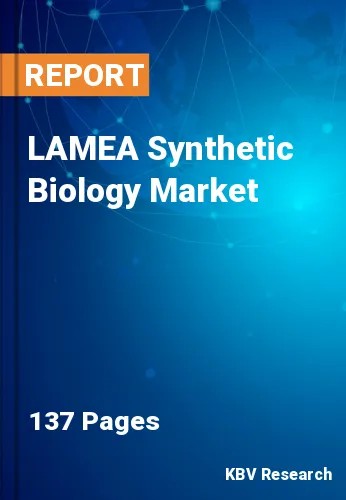The Latin America, Middle East and Africa Synthetic Biology Market would witness market growth of 20.6% CAGR during the forecast period (2023-2030).
The industrial biotechnology sector is a significant adopter of synthetic biology. Engineered microorganisms are harnessed to produce bio-based materials, chemicals, and biofuels. This application contributes to sustainability goals by providing alternatives to traditional, fossil fuel-based manufacturing processes. Using bio-based materials, chemicals, and fuels produced through synthetic biology contributes to reducing carbon footprints. Unlike traditional manufacturing processes that rely on fossil fuels, industrial biotechnology offers a sustainable pathway with lower greenhouse gas emissions.
Furthermore, industrial biotechnology leverages renewable feedstocks, such as plant biomass and agricultural residues, to produce bio-based products. This reduces reliance on non-renewable resources and supports the development of a circular and sustainable bioeconomy. Synthetic biology in industrial biotechnology helps decrease dependency on finite and environmentally harmful resources by providing alternatives to traditional, fossil fuel-based manufacturing processes. This aligns with the transition towards a more sustainable and circular economy.
Increasing investments in biotechnology and life sciences infrastructure in LAMEA countries can foster the development and adoption of synthetic biology. This includes the establishment of research institutions, laboratories, and biotech hubs. The demand for sustainable and bio-based products is increasing globally, and LAMEA is no exception. Synthetic biology offers the potential to produce bio-based materials, chemicals, and fuels, aligning with the growing emphasis on environmentally friendly solutions. Hence, these aspects can increase growth in the regional synthetic biology market.
The Brazil market dominated the LAMEA Synthetic Biology Market by Country in 2022, and would continue to be a dominant market till 2030; thereby, achieving a market value of $1,033.2 million by 2030. The Argentina market is showcasing a CAGR of 21.2% during (2023 - 2030). Additionally, The UAE market would register a CAGR of 20.1% during (2023 - 2030).
Free Valuable Insights: The Worldwide Synthetic Biology Market is Projected to reach USD 46.7 Billion by 2030, at a CAGR of 18.7%
Based on End-use, the market is segmented into Biotechnology and Pharmaceutical Companies, Academic and Government Research Institutes, and Others. Based on Product, the market is segmented into Oligonucleotide/Oligo Pools and Synthetic DNA, Enzymes, Cloning Technologies Kits, Xeno-Nucleic Acids, and Chassis Organism. Based on Technology, the market is segmented into PCR Technology, NGS Technology, Genome Editing Technology, Bioprocessing Technology and Others. Based on countries, the market is segmented into Brazil, Argentina, UAE, Saudi Arabia, South Africa, Nigeria, and Rest of LAMEA.
By Application
By End-use
By Product
By Technology
By Country
Our team of dedicated experts can provide you with attractive expansion opportunities for your business.

